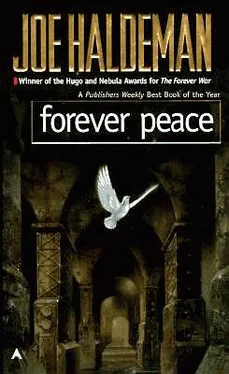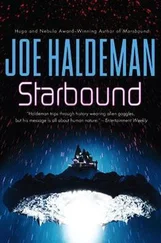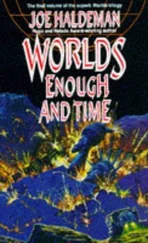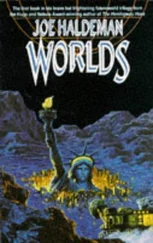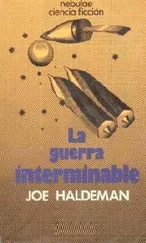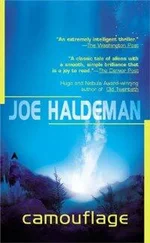Macro (like one of those Regents) was a member of a militant and supersecret sect within a sect: the Hammer of God. Like all Enders, they believed God was about to bring about the destruction of humankind.
Unlike most of them, the Hammer of God felt called upon to help.
ON THE WAY BACK to campus I took a wrong turn and, circling back, passed a downscale jack joint I'd never seen. They had feelies of group sex, downhill skiing, a car crash. Done there; been that. Not to mention all the combat ones.
Actually, I'd never done the car crash. I wonder if the actor died. Sometimes Enders did that, even though jacking's supposed to be a sin. Sometimes people do it to be famous for a few minutes. I've never jacked into one of those, but Ralph has his favorites, so when I'm jacked with Ralph I get it secondhand. Guess I'll never understand fame.
There was a new sergeant at the gate to the university, so we went through the delaying song and dance again.
I pedaled aimlessly through the campus for an hour. It was pretty deserted, Sunday afternoon of a long week-end. I went into the physics building to see whether any students had slipped papers under my door, and one had-an early problem set, wonder of wonders. And a note saying he'd have to miss class because his sister had a coming-out party in Monaco. Poor kid.
Amelia's office was one floor above mine, but I didn't bother her. I really ought to work out the answers to the problem set, get ahead of the game. No, I ought to go back to Amelia's and waste the rest of the day.
I did go back to Amelia's, but in a spirit of scientific inquiry. She had a new appliance they called the "anti-microwave;" you put something in it and set the temperature you want, and it cools it down. Of course the appliance has nothing to do with microwaves.
It worked well on a can of beer. When I opened the door, wisps of vapor came out. The beer was forty degrees, but the ambient temperature inside the machine must have been a lot lower. Just to see what would happen, I put a slice of cheese in it and set it to the lowest temperature, minus forty. When it came out I dropped it on the floor, and it shattered. I think I found all the pieces.
Amelia had a little alcove behind the fireplace that she called "the library." There was just room for an antique futon and a small table. The three walls that defined the space were glassed-in shelves, full of hundreds of old books. I'd been in there with her, but not to read.
I set the beer down and looked at the titles. Mostly novels and poetry. Unlike a lot of jacks and jills, I still read for pleasure, but I like to read things that are supposed to be true.
My first couple of years of college, I majored in history with a minor in physics, but then switched around. I used to think it was the degrees in physics that got me drafted. But most mechanics have the usual compulsory-ed degrees-gym, current events, communication skills.
You don't have to be that smart to lie in the cage and twitch.
Anyhow, I like to read history, and Amelia's library was lean in that subject. A few popular illustrated texts. Mostly twenty-first century, which I planned to read about when it was over.
I remembered she wanted me to read the Civil War novel The Red Badge of Courage, so I took it down and settled in. Two hours and two beers.
The differences between their fighting and ours were as profound as the difference between a bad accident and a bad dream.
Their armies were equally matched in weaponry; they both had a diffuse, confused command structure that essentially resulted in one huge mob being thrown against another, to flail away with primitive guns and knives and clubs until one mob ran away.
The confused protagonist, Henry, was too deeply involved to see this simple truth, but he reported it accurately.
I wonder what poor Henry would think about our kind of war. I wonder whether his era even knew the most accurate metaphor: exterminator. And I wondered what simple truth my involvement kept me from seeing.
JULIAN DIDN'T KNOW THAT the author of The Red Badge of Courage had had the advantage of not having been a part of the war he wrote about. It's harder to see a pattern when you're part of it.
That war had been relatively straightforward in terms of economic and ideological issues; Julian's was not. The enemy Ngumi comprised a loose alliance of dozens of "rebel" forces, fifty-four this year. In all enemy countries there was a legitimate government that cooperated with the Alliance, but it was no secret that few of those governments were supported by a majority of their constituents.
It was partly an economic war, the "haves" with their automation-driven economies versus the "have-nots," who were not born into automatic prosperity. It was partly a race war, the blacks and browns and some yellows versus the whites and some other yellows. Julian was uncomfortable on some level about that, but he didn't feel much of a bond with Africa. Too long ago, too far away, and they were too crazy.
And of course it was an ideological war for some – the defenders of democracy versus the rebel strong-arm charismatic leaders. Or the capitalist land-grabbers versus the protectors of the people, take your pick.
But it was not a war that was going to have a conclusive endgame, like Appomattox or Hiroshima. Either the slow erosion of the Alliance would make it collapse into chaos, or the Ngumi would be swatted down hard enough in all locations that they would become a collection of local crime problems rather than a somewhat unified military one.
The roots of it went back to the twentieth century and even beyond; many of the Ngumi traced their political parentage back to when white men first brought sailing ships and gunpowder to their lands. The Alliance dismissed that as so much jingoistic rhetoric, but there was logic to it.
The situation was complicated by the fact that in some countries the rebels were strongly linked to organized crime, as had happened in the Drug Wars that simmered early in the century. In some, there was nothing left but crime, organized or disorganized, but universal, from border to border. In some of those places, Alliance forces were the only vestige of law-often underappreciated, when there was no legal commerce and the population's choice was between a well-stocked black market and essentials-only charity from the Alliance.
Julian's Costa Rica was anomalous. The country had managed to stay out of the war early on, maintaining the neutrality that had kept it out of the twentieth century's cataclysms. But its geographic location between Panama, the only Alliance stronghold in Central America, and Nicaragua, the hemisphere's most powerful Ngumi nation, finally dragged it into the war. At first, most of the patriotic rebels spoke with a suspicious Ni-caraguan accent. But then there was a charismatic leader and an assassination-both engineered by Ngumi, the Alliance claimed-and before long the forests and fields were filled with young men, and some women, ready to risk their lives to protect their land against the cynical capitalists and their puppets. Against the huge bulletproof giants who stalked the jungle quiet as cats; who could level a town in minutes.
Julian considered himself a political realist. He didn't swallow the facile propaganda of his own side, but the other side was just plain doomed; their leaders should be making deals with the Alliance rather than annoying it. When they nuked Atlanta they hammered the last nail into their coffin.
If indeed Ngumi had done it. No rebel group claimed responsibility, and Nairobi said it was close to being able to prove that the bomb had come from the Alliance nuclear archives: they had sacrificed five million American lives to pave the way for total war, total annihilation.
But Julian wondered about the nature of the proof, that they could be "close" to it and not be able to say anything specific. He didn't rule out the possibility that there were people on his own side insane enough to blow up one of their own cities. But he did wonder how such a thing could be kept secret for long. A lot of people would have to be involved.
Читать дальше
